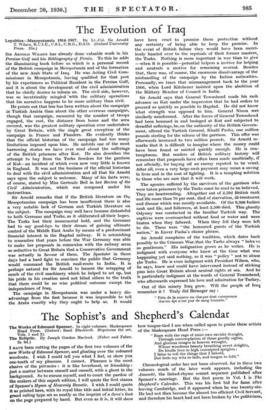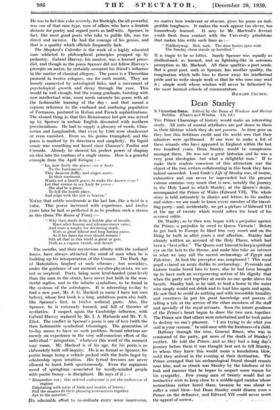The Sophist's and Shepherd's Calendar
I HAVE been cutting the pages of the first two volumes of the new Works of Edmund Spenser, and gloating over the coloured woodcuts. I wish I could tell you what I feel, or show you one-tenth of my pleasure. I cannot. Pleasure is the most elusive of the privacies : it is like loverhood, or friendship : just a matter between oneself and oneself, with a ghost in the background. So to excuse myself, and to court the pardon of the makers of this superb edition, I will quote the first stanza of Spepser's Hymn of Heavenly Beautie. I wish I could quote it as printed here, with its royal blue title and initial letter, its grand roiling type set as neatly as the. imprint of a dove's foot on the page prepared by hand. But even as it is, it will show
how tongue-tied I am when called upon to praise these artists of the Shakespeare Head Press :—
" Rapt with the rage of mine own ravisht thought,
. 'Through contemplation of those goodly sights, And glorious images in heaven wrought, Whose wondrous beauty breathing sweet delights, Do kindle love in high coneeipted sprights I faire to tell the things that I behold, But feele my wits to faile, and tongue to fold."
Chronological order has not been observed, for in these two volumes much of the later work appears, including the Anwretti, the linked-rhyme sonnet sequence published after Spenser's. marriage. But the first poem in VoL I is The Shepherd's Calendar. This was his first bid for fame after leaving Cambridge, and it appeared when he was twenty-six. He had not then become the almost too efficient Civil Servant, and therefore his heart had not been broken by the politicians.
He was to feel this yoke severely, for Burleigh, the all-powerful, was one of that rare type, men of affairs who have a brutish distaste for poetry and regard poets as half-wits. Spenser, in fact, like most good poets who take to public life, was too direct and incisive. He had the courage of his genius, and that is st. quality which officials frequently lack.
The Shepherd's Calendar is the work pf a highly educated man addicted to philosophical principles propped up by pedantry, Gabriel Harvey, his mentor, was a learned proso- dist, and though in the poem Spenser did not follow Harvey's precepts on metre, he certainly accepted his friend's influence in the matter of classical allegory. The poem is a Theocritan pastoral: in twelve eclogues, one for each month.. They are loosely connected by astrological links, and a, movement of psychological growth and decay through the year. This would be well enough, but the young graduate, bursting with new intellectual wine, must needs saturate his poem with all the fashionable learning of the day : and that meant a copious reference to the confused and confusing population of Parnassus, postured in Italian and French sophistieations. The absurd thing is, that this Renaissance hot-pot was served up by Spenser in archaic English decorated with northern provincialisms. He had to supply a glossary of words, Chau- cerian and Langlandish, that even by 1580 were obsolescent or even vanished. Even so, his genius triumphed, and the poem is marked by its directness and simplicity. Its liquid music was something not heard since Chaucer's Troilus and Cressida. Already he showed his perfect power of shaping an idea into the confines of a single stanza. Here is a graceful example from the April Eclogue :- " Lo, how finely the graces can it foots
To the Instrument : They dauneen deftly, and singes soote, In their meriment.
Wants not a fourth grace, to make the daunee oven ?
Let that rowmo to my Lady be yeven :
She shat be a grace, •
To fyll the fourth place, And reign with the rest in heaven."
Notice that subtle accelerando in the last line, like a twirl in a valse. This power increased with experience, and twelve years later he had so perfected it as to produce such a stanza as this (from The Ruins of Time) :---
", Why then Booth flesh, a bubble glee of breath, Hunt after honour and advauncement And reare a trophy for deVouring death, With so great labour and long lasting pains, As if his dales for ever should remain 1 Sith all that in this world is great or gale, Doth as a vapour vanish, and decaic.
The months, and their mysterious affinity with the zodiacal forces, have always attracted the mind of man when he is building up his interpretation of the Cosmos. The Dark Age of Materialism laughed at such schemes ; but nowadays, under the guidance of our eminent mystico-physicists, we are not so sceptical. Poets, being more level-headed (star-level) than the man in the street, have never lost faith in the won- derful mythos, and in the infinite symbolism, to be found in the systems of the astrologers. It is interesting to-day to fmd a new poet, Mr. J. G. Macleod (a name I have not seen before), whose first book is a long, ambitious poem also built, like Spenser's first, in twelve zodiacal parts. Also, like Spenser, he is extremely learned, and full of theories of aesthetics. I suspect again the Cambridge influence, with Gabriel Harvey replaced by Mr. I. A. Richards and Mr. T. S. Eliot. The conflict in Spenser's poem is one of love (with the then fashionable symbolical trimmings). The generation of to-day seems to have no such problem. Sexual relations arc merely an experience in the very self-conscious effort of the individual " integration," whatever this word of the moment may mean. Mr. Macleod is of his age, for his poem is an elaborately built self-inquiry. He is as formal as Spenser, his poetic image being a vehicle packed with the fruits begot by scholarship upon intuition. His lyrical fervours are never allowed to burst forth spontaneously. Even- the rapturous mood of springtime—associated by woolly-minded people with poetic frenzy—is disciplined. He says of it :- " Rhapsodize not : this ordered endeavour is yet the endeavour of engines
Palpitating with noise of birds and motion of leaven Still the seasons fit their phrasing instruments together - • Apt to the notation."
His admirable effort to co-ordinate -every sense impression;
no matter how irrelevent or obscure, gives his poem an indi- gestible toughness. It makes the work appear too clever, too humorlessly learned. It may be Mr. Macleod's fervent youth fresh from contact with the University grindstone that makes him write such lines as :--
" Tiddledywog. Meh. meh. The door bursts open wide The Sunday china stands up horrified."
It is tragic to be so bitter. Surely Spenser was -equally- as disillusioned, as learned, and as lightning-like in sensuous perception as Mr. Macleod. All these qualities a poet needs. But a great poet, such as Spenser, has another quality, the imagination which tells hint to throw away his intellectual pride and to write simple work so that he who runs may read it ; simple work whose wisdom will never -be fathomed by the most learned schools of commentators. -
RICHARD CHURCIT.







































 Previous page
Previous page